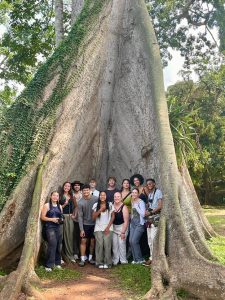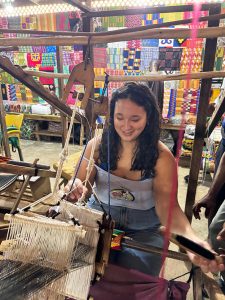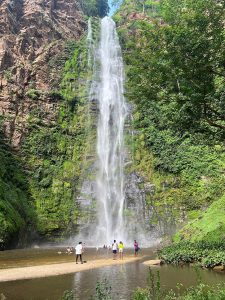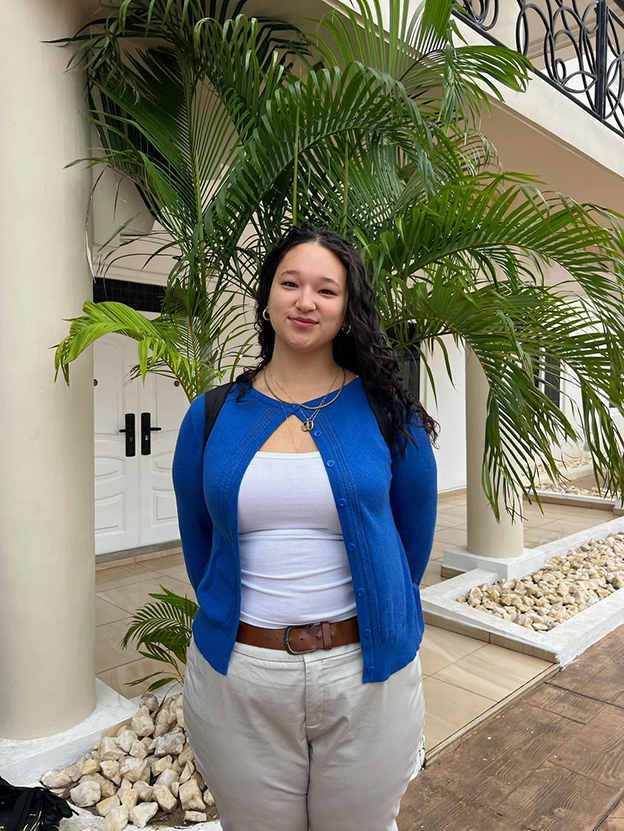“Go stand with your sister over there,” said the Visa officer at Kotoka International Airport. This was my very first interaction with Ghanaian culture, as I stepped off the plane only a month ago.

This moment confirmed that I had made the right choice to participate in the University of Oregon’s (UO) “Media in Ghana” program; an internship program bringing UO students to Ghana to get hands-on experience within the journalism industry.
So I went to stand next to my golden straight haired, green eyed ‘sister’, someone who couldn’t be further opposite to my dark ringlets, tanned skin and almond shaped eyes.
The use of ‘sister’ reminded me of the familial words we use in the Philippines to denote the community members around us.
‘Dong’, for younger brother, ‘Day’ (pronounced die) for younger sister, ‘Nang’ for older women; these terms showing the close kinship our community encompasses for each other.
So, I now have ‘sister’ to add to my vocabulary.
My time in Ghana has been nothing short of spectacular, the evening warm breezes, reminding me of home.
The light air would follow me through the castles of Cape Coast and intensifying, the closer we would get to the crashing waves kissing the sand.
I found the light air wishing around the strings of the kente looms, weaving in and out with such intricacy.

I saw it accompanying the mist fly off Wli Falls, as its millions of gallons of water thundered down a cliffside.
And I felt it in my lungs, turning into heat, as I breathed fire, finding out everything here is spicy. Today, I thought I was safe buying chicken strips, a basic, plain staple in the states. Nope.
But I’ve enjoyed challenging myself. I am not one to have a spice tolerance, but I know I will be better for it in the end.
It’ll allow me to really be able to appreciate the many floating habaneras in the fish stew instead of fearing them. Then I will be able to cherish the gift of banku and kenkey.
I will be able to appreciate the time and effort that went through beating and fermenting corn and cassava in the moment, rather than spending my meal panicking, thinking I will never recover from searing pain; the pinpricks dancing on my lips and tongue.
And then maybe I can even work up to adding ‘shito’ (hot black pepper sauce) on top.
One morning, on an early errand, my stomach would not stop grumbling. My Bolt driver turned to me to confirm, ‘Shopprite’ was my destination. I nodded my head. Another grumble came from my abdomen. I pulled out dried plantains to find some peace. As I munched on my snack, my driver turned to me smiling and said, “Am I invited?” It took me a second to register what he was saying.
“To the store?” I asked.
“No you are eating chips, am I invited?” he chucked, “But I was joking”. He turned back to the road. I tried to give him some chips, but he denied me.
Later in the afternoon, on my way back home, the same thing happened but in reverse. My Bolt driver had bought a boflot (fried yeasted wet dough).

As he pulled the small plastic through his car window, he turned to me and said, “You are invited,” I heard through my blasting headphones. And even though already going through this, I responded, “To go where?” I was lost. He held out the boflot and repeated himself. I said no thank you, but couldn’t help but chuckle at these exchanges.
In the states you would simply ask, “You want some?” or “Can I have some?” but the small change in vocabulary gives the small action more depth entirely. The question asked here establishes a shared experience, community, and a mutual bid of connection. A differing view than the American precedent of individualism and division.
This idea extends outside of these exchanges as well. I see it especially in the markets.
These spaces put you face to face with those, growing your foods, cooking your meals, connecting with neighbors, curating a sense of trust and belonging.
It reminds me of the markets in the Philippines. When the sun was peaking over the horizon, I would go to paonay, with my dad; bartering with people he had grown up with.
It is a special thing, we lack in America. We have recreated on a small scale; having small “farmer” markets every Saturdays. But it can never live up to the accessibility of products here.
We visited the Kejeta Market in Kumasi. And I know this is an extremist example but the bustling crowds, constant exchange of goods and words, was a sight I have never witnessed. The stalls went on for miles. From machetes, to yams, to wigs, this place had it all.
“I think we are lost,” I told my friend, as we scurried past a wall of jerseys. The part of this market inside of a giant warehouse was a maze. We had lost the 10 other students in the chaos of the crowd.
My friend and I would head to a fraction of natural light, thinking we had found the exit, only to find a chain linked window.
But after an hour and help from a lady selling baby bottles we made it out. The consumer in me never felt so good, to have everything I ever needed at my finger tips,
Last week, I ran out of my curl cream, conditioner, and mousse; all very necessary to keep my hair hydrated and healthy. To be able to walk into the nearest Shopprite, and have a multitude of products at my finger tips, felt empowering.
In the states, curly hair products only reside in the small section, with limited availability. The sheer amount of choice, entire isles catered to me, continued to make me feel embraced in this new environment.
I could go on and on about my time in Ghana. It has been an awe inspiring trip. Unfortunately, my stay here is only extended to six weeks. Now five and a half weeks in, I can confidently say, it won’t be enough; confirming my thoughts from when I arrived, joining my sister at baggage claim.
By McKenzee Manlupig








